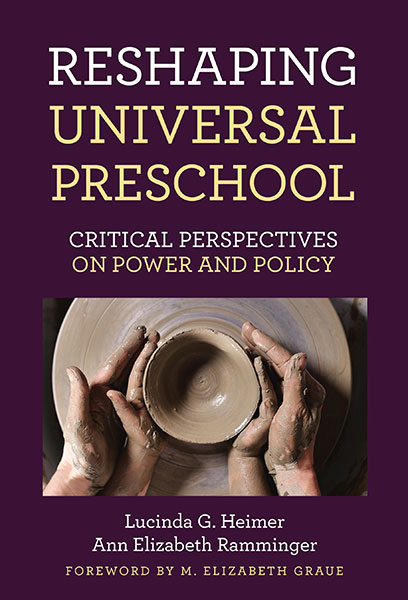Professors: Request an Exam Copy
Print copies available for US orders only. For orders outside the US, see our international distributors.
Lucinda G. Heimer, Ann Elizabeth Ramminger
With: Katherine K. Delaney, Sarah Galanter-Guziewski, Lacey Peters, Kristin Whyte
Foreword by: Beth Graue
Publication Date: January 17, 2020
Pages: 160
Series: Early Childhood Education Series

This is a comprehensive, detailed account of the complex state of Universal Preschool (UPK) in the United States. As discussions regarding access, equity, and the societal value of early childhood education enter into the public forum, this book offers critical perspectives for next steps. The authors join the synergy of wonder to the practicality of wisdom to navigate complicated systems of power, relationships, and discourse. Cross-sector efforts to address planning and implementation of UPK are examined while acknowledging the current inequitable nature of the field. The book is a cautionary tale that includes historical and current vignettes showing that some issues in UPK collaboratives are constant across time. To bring the discussion alive, a variety of stakeholder perspectives offer insights into the “why” behind policy decisions. Reshaping Universal Preschool will help stakeholders explore, reflect, and apply lessons learned to existing or potential UPK collaborative efforts.
Book Features:
Lucinda G. Heimer is associate professor and program coordinator for the dual licensure program in early childhood education special education at the University of Wisconsin–Whitewater. Ann Elizabeth Ramminger is founder of Early Childhood Solutions Consulting based out of central Massachusetts. With contributions by Katherine K. Delaney, Sarah Galanter-Guziewski, Lacey Peters, and Kristin Whyte.
“ Reshaping Universal Preschool is an ideal book for those who are interested in exploring the early education landscape in the United States from a critical perspective. In the quest for establishing universal preschool and equal access to high quality early education, Heimer and Ramminger’s book offers practical recommendations on how to do so and, at the same time, acknowledges and highlights some of the associated challenges of such an endeavor.”
—Teachers College Record
“Through their critical analysis of the formulation and implementation of universal prekindergarten programs in the past and present, Heimer and Ramminger add new voices to a conversation that is stuck on issues of expansion, standardization, and what works. Their work exposes the failed logic of collaboration as the means to attain democratic preschool programs, and in doing so, they challenge those committed to offering universal access to early education programs to let go of the past and think anew about what is possible. This timely book not only demonstrates why this work must be done but also offers insight as to how those who work across the multiple layers of early childhood programs and policies might lead this movement forward.”
—Christopher P. Brown, The University of Texas at Austin
“Heimer and Ramminger tackle the complexities of cross-sector initiatives through the topic of universal preschool programs. They thoughtfully portray the challenges of this work, including attention to all stakeholders in these systems and focusing on issues of equity. Because they declare collaboration to be necessary, they also highlight opportunities and paths forward in this vital book.”
—Nancy File, University of Wisconsin-Milwaukee
Contents (Tentative)
Foreword Elizabeth Graue
Acknowledgments
Preface
Terminology
A Dilemma
Our Lens
Chapter Summaries
Our Hopes
1. Early Education in the U.S.: Is it Fair Game?
Educational Equity in the U.S.—A Quick History
Public Education
Why Should Early Education be Treated Differently?
The Current U.S. Early Educational System—A Patchwork
Early Childhood Equity in Other Countries
Have Societal Attitudes Changed in the U.S.
Summary
2. Universal Preschool: Panacea or Perpetuated Patchwork
Defining Universal Preschool
Key Components of Early Childhood Programs
Universal Preschool Efforts Require Collaboration
What Does Collaboration Have to Do with Policy?
Pandora’s Box of Power/Knowledge Relationships
Collaboration Is Constructed Through Discourse
Panacea or Propensity for Power
Collaborative Leadership
The Early Childhood Collaborative (ECC): A Past Story of UPK
Summary
3. Encouraging All Voices in the Universal Preschool Conversation
Collaborative Policy
Past Story: EEC—Voices at the Table
Ensuring All Voices in Current Universal Preschool Efforts
Present Story: I Don’t Know Why They Don’t Come (Kristin Whyte)
Summary
4. Equitable Access to Universal Preschool: Enrollment Issues
Policy Is Multi-faceted
Past Story: ECC—Come One, Come All
Enrollment Decisions
Present Story: Enrollment Silos and Conundrums (Sarah Galanter-Guziewski)
Summary
5. Leading the Curriculum Process: One Size Does Not Fit All
Curriculum in Early Education
Past Story: ECC—Who’s the Boss?
Present Story: Who Gets to Say we can Play in 4K? (Kate K. Delaney)
Summary
6. A Long and Winding Road
What Have We Learned from Research and Stories?
Next Steps on the Universal Preschool Journey
Present Story: NYC Pre-K for All—Conflicting Interests and Beliefs Around Curriculum and Assessment (Lacey Peters)
Summary: Keeping Wonder at the Heart of Wisdom
Conclusion
Appendix: Methodology
References
Index
About the Authors
Professors: Request an Exam Copy
Print copies available for US orders only. For orders outside the US, see our international distributors.